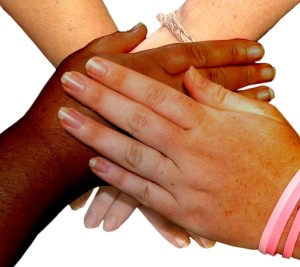- Calls to this hotline are currently being directed to Within Health, Fay or Eating Disorder Solutions
- Representatives are standing by 24/7 to help answer your questions
- All calls are confidential and HIPAA compliant
- There is no obligation or cost to call
- Eating Disorder Hope does not receive any commissions or fees dependent upon which provider you select
- Additional treatment providers are located on our directory or samhsa.gov
Research Studies Show the Value of Support Groups
Contributor: Leigh Bell, BA, writer for Eating Disorder Hope
 Support groups for people with eating disorders can be very helpful and are available in most areas — even online — for low or no cost. Research underscores the important role support groups play in recovery from eating disorders, for which relapse is frighteningly high at roughly 30-50%1.
Support groups for people with eating disorders can be very helpful and are available in most areas — even online — for low or no cost. Research underscores the important role support groups play in recovery from eating disorders, for which relapse is frighteningly high at roughly 30-50%1.
Support groups have even proven prevention of disordered eating in middle-school students2. Individuals receive from support groups vast amounts of encouragement, information, and the feeling they aren’t “the only one.” There is a “copycat” element of support groups, and when one or more members’ slip back into the eating disorder and practices behaviors, some of the peers may be tempted to do the same. However, the benefits of support groups usually outweighs this minimal risk.
Moderated Support Groups
Many support groups are moderated by a professional, for example some treatment centers offer therapist-led support groups for former clients and others who are practicing recovery in real life. Still other groups like Eating Disorder Anonymous, based on the widely known 12-step process, can be started by any EDA member but must follow an accepted format.
Little research exists on the general benefit of support groups in prevention and/or recovery from an eating disorder, but what’s out there shows these groups can be helpful.
For example, one study of 214 7th- and 8th-grade girls — who are typically in the throes of adolescence, body changes, and examining self-image — looked at the effect of a school-based peer-support group designed to improve body image, self-esteem, and to reduce negative eating attitudes and behaviors (McVeya, et a.l, 2003). Of the 214 study participants, the 115 who were in the support group had increased weight-related self-esteem and decreases in dieting.
Support Groups Aren’t Always Official Groups
 Another study showed spirituality could add to the benefits of support groups. The researchers looked at 122 women in inpatient eating-disorder treatment. Some were in a spirituality group and others were in a cognitive/emotional supports group; and those in the spirituality group improved significantly more quickly in the first four weeks of treatment.
Another study showed spirituality could add to the benefits of support groups. The researchers looked at 122 women in inpatient eating-disorder treatment. Some were in a spirituality group and others were in a cognitive/emotional supports group; and those in the spirituality group improved significantly more quickly in the first four weeks of treatment.
Research shows the benefits of a support group doesn’t necessarily have to come from a group but can arise from a significant relationship with just one person. MentorCONNECT is a nonprofit organization that pairs mentors, most of who are recovered at least one year from an eating disorder, with a mentee who is actively practicing an eating disorder but wants to recover.
A study of this program analyzed 141 participants of MentorCONNECT, consisting of 34 mentors, 58 mentees who were matched with a mentor, and 49 mentees searching for a mentor3. Those matched with a mentor showed greater improvement in 7 of 12 measurements of mental health, including better relationships; improved future outlook; and psychological, emotional, and physical well-being, than those without a mentor. Even the mentors reported improved recovery skills from the relationship.
Online Support Groups
The internet has grown a huge number of online support groups, which also show research-based benefits to those who participate. These support groups offer constant access and many of the same “therapeutic elements of face-to-face groups, such as support, information, problem-solving, and diminishment of shame and guilt,” according to a study of this electronic medium. The study found the vast majority of communication in these online groups involved “encouragement & praise” and “giving or asking for information.”
However, one should use caution when accessing the internet for support with an eating disorder for several reasons. First, the aural and visual cues present in face-to-face interactions aren’t online and meanings can be misinterpreted.
 Secondly, there are many pro-eating-disorder sites, upon which it’s easy to stumble in a search for healthy support groups; and if someone is walking the line between recovery and the eating disorder, such sites may be difficult to avoid. Lastly, there’s little control over who can participate in these forums, and some signing on may provide hurtful or dangerous information (McCormack, et. al, 2009).
Secondly, there are many pro-eating-disorder sites, upon which it’s easy to stumble in a search for healthy support groups; and if someone is walking the line between recovery and the eating disorder, such sites may be difficult to avoid. Lastly, there’s little control over who can participate in these forums, and some signing on may provide hurtful or dangerous information (McCormack, et. al, 2009).
How the Internet Can Be a Poor Environment
Such online forums and even traditional support groups may spread eating-disordered behaviors, one study posits4. “Social contagiousness may be more likely to occur within the high-density environments of eating disorder communities, such as special websites or online forums and clinical settings in which eating-disordered patients are treated together,” writes the study’s author Walter Vandereycken, M.D., Ph.D, University of Leuven, Belgium.
Even worse and more frightening, recent news reports say pedophiles and sexual predators have taken to “Pro-Ana” sites and others aimed at those with eating disorders, seeing these individuals as more vulnerable5. While such cases are likely rare, they speak to the precautions necessary when using the internet for support groups of any nature.
Community Discussion – Share your thoughts here!
How have support groups impacted your recovery? Do you attend support groups online or in person, what advice do you have to share?
References:
- Franco, K. (2012, March 1). Eating Disorders. Retrieved July 15, 2015, from www.clevelandclinicmeded.com/medicalpubs/diseasemanagement/psychiatry-psychology/eating-disorders/Default.htm
- McVeya, G., Liebermanb, M., Voorbergc, N., Wardropec, D., & Blackmored, E. (2003). School-based peer support groups: A new approach to the prevention of disordered eating. Eating Disorders: The Journal of Treatment & Prevention, 11(3), 169-185.
- Perez, M., Kroon Van Diest, A., & Cutts, S. (2014). Preliminary examination of a mentor-based program for eating disorders. Journal of Eating Disorders, 2(24).
- Vandereycken, W. (2012). How ‘contagious’ can eating disorders be in the eyes of patients? Eating Disorders Review, 23(2).
- Smith, J. (2015, June 11). Pedophiles Have Found a New Place to Target Potential Victims. And It Is Truly Sick. Retrieved July 15, 2015, from http://www.ijreview.com/2015/06/342860-pedophiles-found-new-place-online-lurk-horrifying/
About the Author:
Leigh Bell holds a Bachelor of Arts in English with minors in Creative Writing and French from Loyola Marymount University in Los Angeles. She is a published author, journalist with 15 years of experience, and a recipient of the Rosalynn Carter Fellowship for Mental Health Journalism. Leigh is recovered from a near-fatal, decade-long battle with anorexia and the mother of three young, rambunctious children.
Last Updated & Reviewed By: Jacquelyn Ekern, MS, LPC on July 31st, 2015
Published on EatingDisorderHope.com

